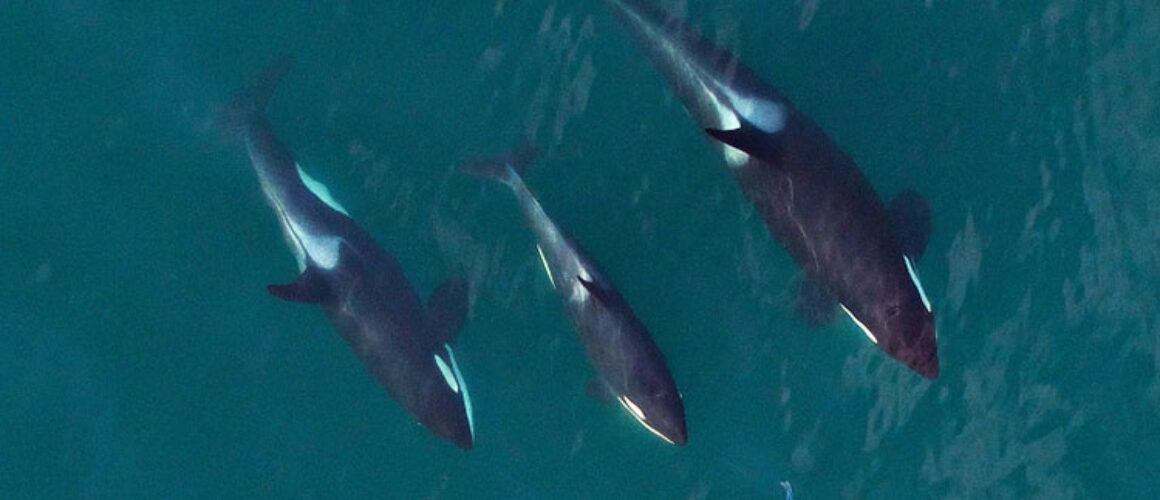Southern Resident Killer Whales in 2022
The Center for Whale Research recently released the latest census of the Southern Resident killer whales (SRKWs) of the northeast Pacific Ocean. This population, which once flourished with over 100 orcas, is listed as endangered in both the USA and Canada. In the previous census, there were 74 SRKWs. With three deaths and two births since then, the population is down to 73.
73
73 individuals that we have named. 73 individuals that may have names for each other. 73 individuals that have incredibly strong familial bonds. 73 individuals that can communicate with each other but not with any other orcas on the planet. 73 individuals that love to swim, play, and munch on salmon. 73 individuals that grieve their dead and want to survive. 73 individuals that are depending on us to save them before it is too late.
The Southern Resident Killer Whales
The SRKWs are one of the most well-studied and well-known populations of orcas in the world, allowing researchers to determine a fairly accurate census count. Like other orca populations, the SRKWs are some of nature’s ultimate mama’s boys and girls, where offspring typically stay with their mothers for life. Matrilines are closely related form pods, and the Southern Resident Killer Whales are made up of three pods: J-, K-, and L-Pods. J-Pod now has 25 members, K-Pod only has 16, its lowest population in 20 years, and L-Pod is down to 32, its lowest count since the census began in 1976.
In Memoriam
Three SRKWs have been declared deceased in 2022. They will be deeply missed and remembered with love.
*K21, Cappuccino, age 35
*K44, Ripple, age 11
*L89, Solstice, age 29
Both K21 and L89 lived to the average lifespan for male SRKWs. Their deaths are mourned but not alarming. Far more concerning is the presumed death of K44.
He was last seen alive in April 2022. The body of a juvenile male orca was found entangled in crabbing gear off the coast of Oregon in late June. It was about the same size as K44 and had markings similar to those of the SRKWs. Unfortunately, due to a lack of photographs and biological samples of the entangled orca, a definitive identification could not be made. However, K44 has not been spotted in recent encounters with his family, and he has been declared deceased.
In Celebration
The SRKWs welcomed two new babies in 2022. Both calves are reported to be doing well.
*J59, a female, was born to J37, Hy’Shqa, in February.
*K45 (sex currently unknown) was born to K20, Spock, in April.
Welcome to the world, little ones!
How Did We Get Here?
Before SRKWs were captured for display at marine parks, they numbered over 100. From the 1950s to the early 1970s, more than 50 wild SRKWs—around 40% of the population—were captured. At least 13 died in the process, and 45 were sent to marine parks. When the Center for Whale Research conducted its first survey in 1976, there were a mere 68 SRKWs. The population peaked at 98 in 1995 but has been continuously declining since 2006. Now only 73 remain.
Population Under Threat
Although they are no longer captured for marine parks, the SRKWs face serious threats, including pollutants and toxins, disturbance from boats, and lack of sufficient prey. They have some of the highest levels of contaminants of any orca population in the world, which can affect their health, longevity, and reproduction. A serious oil spill could decimate the population.
Noise disturbance from boats makes it harder for them to communicate and forage for prey. Several SRKWs have died from vessel strikes in the past two decades, and the possibility that one died entangled in fishing gear is a grave concern.
Ultimately, though, their most pressing threat is a lack of food. The SRKWs primarily feed on Chinook salmon, which are listed as endangered, just like the whales themselves. There are proposed efforts to rebuild this salmon population, such as breaching the lower Snake River dams, habitat restoration, and improving water quality.
Breaching the dams is one of the most crucial actions that can be taken to help provide the SRKWs with enough prey. This proposal has been met with resistance, but it has to happen.
Without salmon, they cannot withstand the high levels of toxins in their bodies. Without salmon, they cannot reproduce successfully. Without salmon, they cannot survive.
73…Plus 1
While discussing the Southern Resident Killer Whales, we cannot forget the one member of this population that is still alive in captivity: Tokitae. Under her stage name “Lolita,” Tokitae has been living at Miami Seaquarium for over 50 years–since she was only around four years old. She has also been given the name Sk’aliChelh-tenaut by the Lummi Nation of northwest Washington, who view the SRKWs as a sacred family. Lummi cultural advisors helped the Whale Sanctuary Project develop a plan to bring Tokitae home to the Salish Sea if she is released from Miami Seaquarium.
Sadly, Tokitae’s health has been declining, and she is currently under 24/7 observation. She needs to be healthy and strong to be considered for release. We are keeping her in our thoughts and hearts as she recovers. She deserves to return home and live out her golden years in freedom.
Protect What You Love
There is hope for the SRKWs, but only if we give them a chance. We have to keep their environment clean. We have to give them space from boats. We have to breach the dams and restore the salmon population. We have to make our voices heard and never give up. We will keep fighting…
Until they are all safe.
Until they are all free.
By supporting Orca Legacy, you help support the Whale Sanctuary Project, the creation of North America’s first seaside sanctuary, and bringing Tokitae home.
25% of all of Orca Legacy’s profits go directly to the Keiko Legacy Fund of the Whale Sanctuary Project. Please check out our latest collection dedicated to Tokitae, and wear your support for her release.
Thank you for helping break the tanks!
Written by Elizabeth Hartman
________________________________________________________________________
References
Center for Whale Research. (n.d.). Our research: Orca survey. https://www.whaleresearch.com/orcasurvey
Center for Whale Research. (2021, August 6). K21. https://www.whaleresearch.com/k21
Center for Whale Research. (2022, March 2). J37’s new calf J59. https://www.whaleresearch.com/j59
Center for Whale Research. (2022, September). Southern Resident killer whale census 2022. https://www.whaleresearch.com/orca-population
Marine Connection. (2022, June 30). Orca discovered entangled off Oregon coast. https://marineconnection.org/orca-discovered-entangled-off-oregon-coast/
NOAA. (2014, June 25). NOAA Fisheries 10-year study highlights threats to Southern Resident killer whales. https://www.noaa.gov/media-release/noaa-fisheries-10-year-study-highlights-threats-to-southern-resident-killer-whales
NOAA Fisheries. (2000, June 15). Sound strategy: Hunting with the Southern Residents, part 2. https://www.fisheries.noaa.gov/feature-story/sound-strategy-hunting-southern-residents-part-2
NOAA Fisheries. (2021, July 30). Expanded critical habitat signals much of West Coast contributes to recovery of endangered killer whales. https://www.fisheries.noaa.gov/feature-story/expanded-critical-habitat-signals-much-west-coast-contributes-recovery-endangered
NOAA Fisheries. (2022, September 30). Rebuilding interior Columbia basin salmon and steelhead. https://media.fisheries.noaa.gov/2022-09/rebuilding-interior-columbia-basin-salmon-steelhead.pdf
Orca Network. (n.d.). Retire Lolita: It’s time for Tokitae to return home. https://www.orcanetwork.org/retire-lolita
Raverty, S., St. Leger, J., Noren, D. P., Burek Huntington, K., Rotstein, D. S., Gulland, F. M. D., Ford, J. K. B., Hanson, M. B., Lambourn, D. M., Huggins, J., Delaney, M. A., Spaven, L., Rowles, T., Barre, L., Cottrell, P., Ellis, G., Goldstein, T., Terio, K., Duffield, D., … Gaydos, J. K. (2020). Pathology findings and correlation with body condition index in stranded killer whales (Orcinus orca) in the northeastern Pacific and Hawaii from 2004 to 2013. PLoS ONE, 15(12), e0242505. https://doi.org/10.1371/journal.pone.0242505
The Whale Sanctuary Project. (n.d.). Whale Aid: Sk’aliCh’elh-tenaut (Lolita). https://whalesanctuaryproject.org/operational-plan-lolita/





